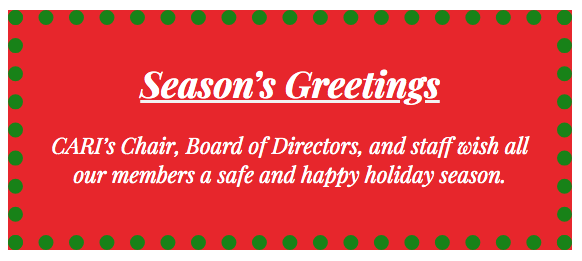THE PULSE
NEWSLETTER OF THE CANADIAN ASSOCIATION OF RECYCLING INDUSTRIES
Vol. 24, Issue 12, December 2019
MESSAGE FROM THE CHAIR
2019 had it’s challenges but we’re ready for what the future holds
Looking back, it’s clear that 2019 has been a challenging year in the recycling industry. We had to contend with market uncertainty, new and more specific regulations, calls for material bans, tariffs and other barriers to trade, and ongoing negative media coverage.
How did CARI respond? Here are some of the areas we focussed on:
- We helped individual members deal with public complaints against their facilities
- We provided resources and support to members needing information and services to improve their businesses
- We spoke to media and the public about the many environmental and economical benefits of recycling, and reinforced the message that #RecyclingWorks
- We promoted industry interests in proposed and evolving stewardship and circular economy programs and regulations in Ontario, B.C., Quebec, and Manitoba
- We petitioned government to take urgent action to resolve the CN Rail strike
- We worked closely with allied associations ISRI, EURic, and BIR to continue the fight against proposed changes to the definition of recycling and recyclers in the Review of Basel Convention Annexes
Our critical advocacy work helped improve the industry’s position at the provincial, national, and international levels. CARI believes the challenges we all encountered this year are a sign of things to come, not an anomaly. As an industry, we must remain proactive. We must prepare to see even more regulations and increased scrutiny of our operations as environmental issues evolve and markets respond accordingly. All of which makes CARI’s advocacy work all the more important for our industry’s future prosperity.
Moving into 2020, CARI and its partner associations will continue the fight to define the recycling industry on our terms, to improve our image, and to ensure the continued success of this vital industry.
Matt Zubick
CARI Chair

New January 1st provisions in Quebec’s Labour Standards Act
As of January 1, 2020, employers who hire one or more temporary foreign workers under the Temporary Foreign Worker Program must declare it to the CNESST.
Also, employers who retain the services of a placement agency or a temporary foreign worker recruitment agency must ensure that the agency has a valid permit issued by the CNESST or will risk being fined.
For details, contact CNESST at 1-844 838-0808 or visit www.cnesst.gouv.qc.ca.
WorkSafeBC research grant competition is now open
British Columbia’s Innovation at Work grant supports small-scale research projects that lead to the development of practical solutions for greater workplace health and safety. Any Canadian resident may apply and applications will be accepted until February 14, 2020. Typically, the awarded grants are a maximum of $50,000 for a duration of one year.
If you have questions about the grant, call 604.244.6300 or email [email protected].
Input sought for Canada-wide Action Plan on Zero Plastic Waste
A one-day engagement session will be held January 29, 2020 in Toronto to gather input for the Canadian Council of Ministers of the Environment’s (CCME) Action Plan on Zero Plastic Waste. One of several such sessions being held across Canada, this one will focus on Result Areas 6 through 10 in the plan, which aim to:
- Empower consumers, businesses and institutions to reduce plastic waste
- Reduce plastic waste and pollution from aquatic activities (shipping, fisheries and aquaculture, tourism and recreation)
- Advance research and monitoring
- Support capture and clean-up of plastic litter in the environment
- Contribute to global action on plastic
The session will be held in English only and registration is required. For details, contact Charles Thrift at [email protected] or (204) 948-2032.
EPRA/RECYCLE MY ELECTRONICS CELEBRATES RECYCLING ONE-MILLION TONNES OF ELECTRONICS ACROSS CANADA
Contributed to The PUSLE by the Electronic Products Recycling Association (EPRA)
A shared achievement
Recycling one million tonnes of electronics is a momentous accomplishment, but it’s much more than simply a number. To put it into perspective, one million tonnes of end-of-life electronics would fill a row of pick-up trucks stretching from Vancouver to St. Johns and back again. The power of recycling one million tonnes of e-waste saves the energy equivalent to power almost five million homes for one year.
A great deal of effort, hard work and oversight by the EPRA/Recycle My Electronics programs in nine provinces across Canada, and their obligated stewards was key to this diversion achievement.
Not only were one million tonnes of e-waste diverted from landfill, they were only handled by recyclers verified under the national Electronics Recycling Standard (ERS), ensuring that they were managed in a safe and environmentally sound manner. These approved processors are required to meet over 150 stringent safety protocols to ensure the health and safety of both their employees and the environment.
“EPRA is proud to have hit this milestone of diverting one million tonnes of e-waste from Canadian landfills through the program and preventing it from being illegally exported. We celebrate this achievement with Canadians from coast to coast to coast who have embraced our message. We are dedicated and invigorated to continue building on this achievement.”
– Cliff Hacking, President and CEO, EPRA
For over a decade, the EPRA/Recycle My Electronics program has been supporting its network of steward and stakeholder organizations to achieve regulatory compliance at the local, provincial and national level.
EPRA programs ensure the integrity of safe and secure recycling within Canada through the implementation of the ERS, paired with a robust audit framework. These standards address all elements of the supply chain including:
- environmental management practices.
- worker health and safety controls.
- enhanced data security measures.
- downstream processing accountability.
In Canada, studies show that approximately 80% of Canadians have unused electronics in their home, ready to be recycled. That’s why continuing the conversation all across Canada, through the Recycle My Electronics program has been such a critical success metric for EPRA. The Recycle My Electronics brand provides a beacon for Canadians looking to recycle their electronics through the program’s ever-expanding network of over 2,400 drop-off locations, all across Canada.
One million tonnes of electronics recycled is an impressive achievement, and together with its stewards, EPRA is helping to build a path to a more sustainable future.


